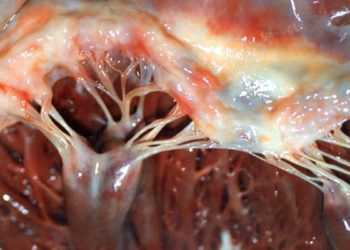Tricuspid repair in patients with mitral regurgitation offers clinical benefits
1. In patients with severe degenerative mitral regurgitation who received mitral-valve surgery, those who also received tricuspid regurgitation surgery had less frequent progression to severe tricuspid regurgitation.
2. Incidence of pacemaker implantation was higher in patients who received concomitant tricuspid repair along with mitral-valve surgery.
Evidence Rating Level: 1 (Excellent)
Study Rundown: Tricuspid regurgitation is commonly seen in patients undergoing mitral valve surgery for severe degenerative mitral regurgitation. However, there is wide practice variability in the management of less-than-severe tricuspid regurgitation at the time of left-sided heart surgery, and there is a gap in knowledge as to understanding the benefits and risks of tricuspid-valve repair at the time of mitral-valve surgery for patients with degenerative mitral regurgitation and less severe tricuspid regurgitation. This study found that patients who received tricuspid-valve repair along with mitral-valve surgery had significantly slower progression of tricuspid regurgitation and a significantly lower incidence of reoperation for tricuspid regurgitation, though the rate of pacemaker implantation was higher in patients who also received tricuspid-valve surgery. This study was limited by a non-diverse patient population and a limited primary endpoint of 24 months, which may not fully capture the clinical progression of tricuspid regurgitation. Nevertheless, these study’s findings are significant, as they demonstrate that performing both tricuspid and mitral valve surgery simultaneously for patients with severe mitral regurgitation and moderate tricuspid regurgitation resulted in less frequent progression of tricuspid regurgitation.
Click to read the study in NEJM
Relevant Reading: The Price of Freedom from Tricuspid Regurgitation
In-Depth [randomized control trial]: This randomized control trial included 401 patients at 39 clinical centers in the United States, Canada, and Germany: 203 who received mitral-valve surgery alone and 198 who received mitral-valve surgery and tricuspid annuloplasty (TA). Patients who had degenerative mitral regurgitation with either moderate tricuspid regurgitation or less-than-moderate regurgitation with annular dilatation of 40 mm or more were included in the study. Patients who had evidence of secondary mitral regurgitation, primary tricuspid-valve disease, and suboptimal volume management were excluded from the study. The primary outcome measured was at 2 years and consisted of reoperation for tricuspid regurgitation, progression of tricuspid regurgitation from baseline, or death. Outcomes in the primary analysis were assessed in the intention-to-treat population using a log-binomial regression model of treatment failure. In patients who received both mitral and tricuspid valve surgery, they had significantly fewer primary end-point events compared to those who only received mitral-valve surgery (3.9% vs 10.2%) (95% confidence interval [CI], 0.16 to 0.86). Furthermore, at 2 years, the progression of tricuspid regurgitation was significantly lower in the mitral and tricuspid valve surgery group compared to the mitral valve surgery group (0.6% vs. 6.1%; 95% CI, 0.01 to 0.69). However, the incidence of pacemaker implantation was significantly higher in the mitral and tricuspid valve surgery group as compared to the mitral valve surgery group (14.1% vs. 2.5%; 95% CI, 2.27 to 14.60). Overall, this study demonstrated that in patients with severe mitral regurgitation undergoing mitral-valve surgery, also performing tricuspid valve surgery if they had tricuspid regurgitation led to a significantly slower progression of the tricuspid disease and need for reoperation, though the long-term clinical benefit can be determined only with longer follow-up.
Image: PD
©2022 2 Minute Medicine, Inc. All rights reserved. No works may be reproduced without expressed written consent from 2 Minute Medicine, Inc. Inquire about licensing here. No article should be construed as medical advice and is not intended as such by the authors or by 2 Minute Medicine, Inc.






